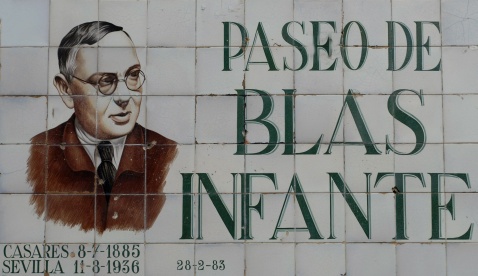
The Promenade of Blas Infante in Ronda |
|
Blas Infante
Blas Infante is known as the "father of Andalucia"having fought for what is today the "Estatuto de Autonomia de Andalucia" (Self-governing statute for Andalucia).
Blas Infante Pérez de Vargas was born at 11am 5th July 1885 in the house at 55 Calle Carrera in village of Casares (Malaga). This birth house is now a museum and tourist office. As a young man he often spent time in the summer at the house of his brother Ignacio, in Sabinillas, now a municipal building, named after his sister in law Casa Matilde.
Between 1896 and 1899 he studied a the College of the "Padres Escolapios de Archidona" this 200 year old building in Archidona now holds Instituto "Luis Barahona de Soto". His secondary eduction was Instituto Aguilar y Eslava in Cabra (Cordoba) the for his Bachillerat at Colegio San Rafael and Instituto Vincente Espinel in Malaga. He returned to Casares where he worked as an assistant to his father who was employed as Secretary to the Municipal Courts. In 1904 he went to the University of Granada where he took a law degree in only two years.
He passed his oposiciones (civil service exams) at the age of 24, and had to wait untill he was 25 (due to a legal stipulation) to take up position of Notary in village of Cantillana (Sevilla).
1913
It was in 1913 during the celebration of an International Congress in Ronda that Blas Infante presented his famous speech that started with the words: "The moment has come for the privileged to die." He carried on to proclaim Andalucia as the most fertile land in Spain. Blas Infante wrote articles promoting his cause for the magazine "Betica", and presented a speech at the Ateneo in Seville on "TheAndalucian Ideal". He subsequently wrote a book of the same name.
1916
In 1916, the first Centro Andaluz was established in Seville, which is today located on O'Donnell street, where the Blas Infante foundation can also be found.
1918
In 1918, the Assembly of Andalucian Provinces was held in Ronda, this was Andalucia's first ever assembly. The building is now the Casino. The official Green - White - Green equal horizontal bands of the Andalucian flag was unveiled. Variations of it were frequently used and documented from Al Andaluz and the Moorish times. Green being the colour of the Omeya dynasty representing the consensus of the people. The white was frequenty used in Eurpean Heraldry represents peace or parliament. The emblem of Hércules was inspired by Cadiz, Andalucia's oldest city and is called "las insignias de Andalucía". The hymn of Andalucia was also published. The modern Andalucia Constitutions of 1982 and 2007 specifically refer to this event.
1918-19
In 1918-19, Blas Infante was elected Diputado (council representative) for the district of Gaucin-Casares-Estepona. In 1919 he also married Angustias Garcia Pradas and eventually fathered three daughters and a son.
The newlyweds moved to Seville, where Infante founded the Abante Library. In October 1921 he gave a speech at teatro Victoria in Isla Cristina (Huelva) titled "El verdadero concepto de la paternidad" (the true consept of paternity) in which illustrius intelectuals such as Alejandro Guichot, Ortega y Gasset and Manuel Siourot were present. The following year he took up position of notary in Isla Cristina and the family moved from Seville. He was there when the coup d'etat by General Primo de Ribiera took place in 1923. In 1931 he moved to Corria del Rio and called his house Dar al Farah ('Casa de la Alegría' in Spanish and 'House of Hapiness' in English). He created the Liberal Junta of Andalucia in Seville.
1936
In 1936, after the February elections, the Andalucian campaign intensified in favour of the Autonomy Statute. Blas Infante was proclaimed President of the new Assembly and the following week in Cadiz, the Diputacion was celebrated with a meeting where all the villages of the province were represented. The Andalucian flag was subsequently raised at the Town Hall of Cadiz, Seville.
But Blas Infante's ideals and achievements fell foul of the fascists under General Franco, and he was imprisoned during the Civil War. On the 2nd August 1936 he was arrested in his house in Coria del Rio by various members of the Filange in the early morning of the 11 August, along with two others, he was taken to the side of the Seville - Carmona road where he was shot dead. As he fell to the ground, he shouted out his famous last words: "Long live free Andalucia!" A monument at Km 4 of the road marks the location, A commemorative service takes place here every year on Andalucian Day. (28 February)
MAIN Places to visit
Blas Infante's birth house is now a museum in the village of Casares and there is a statue in Plaza de España.
Blas infante's last house is now restored and can be visited by arrangement in Coria del Rio.
Other places to visit
Blas infante's junior school is now Instituto "Luis Barahona de Soto" in Archidona. There is a statue in the town.
There are plaques in the corridors of the Law Faculty of the University of Granada.
Location of 1913 International Congress in Casino of Ronda.
Where he worked as a notary is now 'Casa de la Cultura' and there is a plaque on the house (old Calle Larga, 5) where he lived and was married in Peñaflor.
Paseo de Chocolate (now Avenida Ángel Pérez) where Teatro Victoria was before it became a cinema and now a supermarket. Plaque for Ateneo in Isla Cristina and a plaque to Blas Infante in Calle Diego Perez Pascual.
Monument to Blas Infante in Gilena, Seville
Monument to Blas Infante, km 4 of the Seville Carmona Road where he was executed.